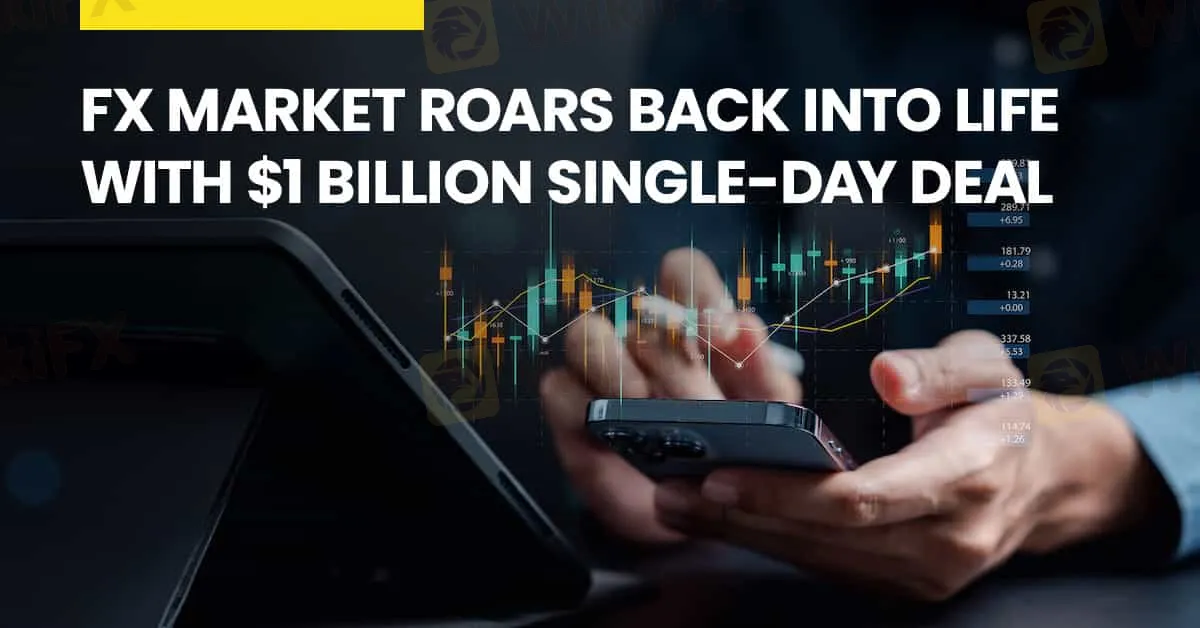简体中文
繁體中文
English
Pусский
日本語
ภาษาไทย
Tiếng Việt
Bahasa Indonesia
Español
हिन्दी
Filippiiniläinen
Français
Deutsch
Português
Türkçe
한국어
العربية
FX MARKET ROARS BACK INTO LIFE WITH $1 BILLION SINGLE-DAY DEAL.
Abstract:On Tuesday, turnover at Nigeria's FX market reached its highest level in a single day since 2017, as a long-standing dollar scarcity that has hampered years eased.

On Tuesday, turnover at Nigeria's FX market reached its highest level in a single day since 2017, as a long-standing dollar scarcity that has hampered years eased.
According to data from the FMDQ Securities Exchange, approximately $1.085 billion was traded that day. That's a 27 percent increase from $857.78 million exchanged last Thursday (the last trading day before a two-day Easter vacation), and nearly five times the market's average daily transactions since the beginning of the year.
“The CBN's reforms are the only reason liquidity is coming back to the market,” stated Tajudeen Ibrahim, director of research and strategy at Chapel Hill Denham, an investment bank in Lagos.
“Before COVID in 2019, we last had the kind of average daily FX trades in the first quarter of this year.”
He continued, “The CBN must now continue the reforms.”
With better liquidity, the naira continued its recent upward trend, reaching a three-month high of N1,278 per US dollar on Thursday, up from N1,309 on Thursday.
Since the Central Bank of Nigeria (CBN) enticed foreign portfolio investors with higher interest rates on government securities and an undervalued naira, dollar inflows into Nigeria have increased. Alongside the actions, a long-standing backlog of FX forwards restored faith in earlier changes.
“FX backlog payments trading opportunities are stimulating the attention of investors,” stated Olaolu Boboye, chief economist of the investment bank CardinalStone.
Carry traders are those that borrow money at low rates and invest it at high ones; Nigeria is becoming more and more notable in this regard. They are largely responsible for the dollar's ascent into Nigeria.
The nation's carry trade offers 21.8 percent using interest rate differential, Angola, just ahead of Egypt (25.2 percent) and Ghana (24.2 percent). The biggest return on carry trade, with returns of 16.1%, when 12-month non-deliverable forwards are used to fluctuation. Ghana finishes out the top three list with 10.7 percent, while Egypt offers 11.9 percent.
Bids for the one-year paper surged to a record-breaking N2.48 trillion on March 27, 17 times higher than the N142 billion the government had planned to raise during a Treasury Bills auction. The spike is thought to have been fuelled by foreign investors, similar to what happened during an auction on March 13. According to the CBN, more than 75% of the bids that were received during the auction came from outside investors.
The dollar inflows are increasing liquidity and providing manufacturers and merchants with much-needed relief.
A gauge of liquidity, monthly FX turnover, has increased to an average of $4.3 billion so far this year from $2.3 billion in 2023 as more international investors flood into a market that they from.
The CBN estimates that total foreign inflows since the start of the year had been $2.1 billion, as opposed to $1.6 billion for the year of 2023. As a result, FX reserves have accumulated; by the end of this month, the CBN predicts that these reserves would total $35 billion.
In the past, investors avoided Nigeria's domestic debt because the central bank opposed the naira's strict management. Foreign traders began to view, which led to a shortage of hard money and skyrocketing inflation.
Resuming dollar sales to BDCs, to sending a clear signal of increasing dollar flows into the central bank's coffers. This has given international investors some peace of mind in regards to the CBN's currency power.
The rise in dollar inflows into Nigeria facilitated by an increase in remittances from the diaspora. The incentive for Nigerians living abroad to transfer money through unofficial to the shrinking difference between official and unofficial prices, which has helped the official market become more liquid.

Disclaimer:
The views in this article only represent the author's personal views, and do not constitute investment advice on this platform. This platform does not guarantee the accuracy, completeness and timeliness of the information in the article, and will not be liable for any loss caused by the use of or reliance on the information in the article.
Read more

Robinhood Launches Options Trading in the UK by 2025
Robinhood to introduce options trading in the UK by 2025 following FCA approval. Discover how this expansion aligns with Robinhood's strategy for global growth and new features.

Why is there so much exposure against PrimeX Capital?
In recent months, PrimeX Capital, a Forex and CFD broker established in 2022, has become a subject of concern in the trading community. However, despite these enticing features, the broker's reputation has been severely tarnished by multiple complaints and a troubling lack of regulatory oversight.

WikiFX Review: Something You Need to Know About Markets4you
Markets4you, is a global forex broker launched in 2007. It was established in the British Virgin Islands. This broker offers its global traders various market instruments.

MultiBank Group Wins Big at Traders Fair Hong Kong 2024
Discover how MultiBank Group, a global leader in financial derivatives, secured three prestigious awards at Traders Fair Hong Kong 2024, highlighting its innovative trading solutions and industry excellence.
WikiFX Broker
Latest News
Two Californians Indicted for $22 Million Crypto and NFT Fraud
Macro Markets: Is It Worth Your Investment?
Trading is an Endless Journey
WikiFX Review: Is Ultima Markets Legit?
Colorado Duo Accused of $8M Investment Fraud Scheme
What Impact Does Japan’s Positive Output Gap Have on the Yen?
RM62k Lost Investment Scam After Joining XRP Community Malaysia on Telegram
Victims of Financial Fraud in France Suffer Annual Losses of at Least €500 Million
Malaysia Pioneers Zakat Payments with Cryptocurrencies
FCA's Warning to Brokers: Don't Ignore!
Currency Calculator


